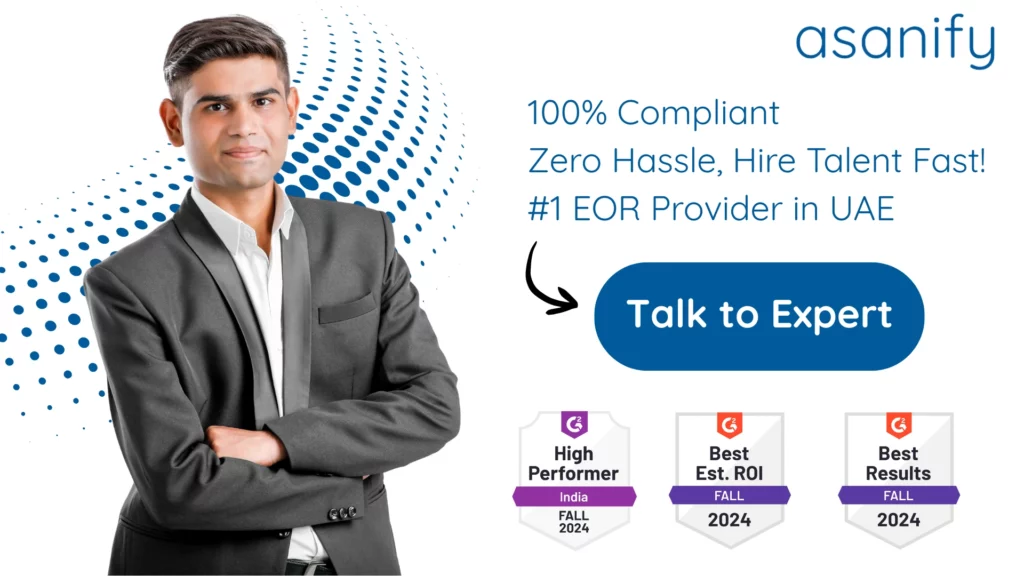Expanding your business into the UAE provides access to one of the Middle East’s most dynamic economies and a strategic hub for trade, finance, and innovation. However, before hiring in the UAE, employers must fully understand the country’s work authorization process. Securing the correct work permit and residence visa for non-UAE nationals is crucial to staying compliant with immigration laws and ensuring smooth onboarding.
Navigating these procedures can be complex, as requirements differ based on the employee’s nationality, job category, and length of employment. Employers must prepare and submit all necessary documentation within the stipulated timelines to avoid delays or penalties. Partnering with specialists or an Employer of Record (EOR) can greatly simplify the process, minimize compliance risks, and accelerate hiring in the UAE.
Table of Contents
- Overview of the UAE’s Work Permit and Visa System
- Understanding Requirements and Eligibility
- Who Needs a Work Permit in the UAE
- Key Conditions for Obtaining a Work Permit
- Employer and Employee Eligibility
- Types of Work Permits and Visas in the UAE
- Comparing Work Permit Types
- Advantages of the UAE’s Work Permit System
- Application Process for Employers
- Required Documents
- Processing Timelines
- Employer Responsibilities and Compliance
- Legal Obligations
- Consequences-of-Non-Compliance
- Maintaining Ongoing Compliance
- Tips for a Smooth Application Process
- How an Employer of Record Can Help
- How Asanify Can Help
- FAQs
Overview of the UAE’s Work Permit and Visa System
The UAE regulates foreign employment through a combined work permit and residency visa system, often referred to as the Employment Entry Permit followed by a Residence Visa. The process varies slightly between emirates but follows federal labor law overseen by the Ministry of Human Resources and Emiratisation (MOHRE) and the Federal Authority for Identity, Citizenship, Customs and Port Security (ICP).
- UAE and GCC citizens – No work permit required.
- Foreign nationals – Must secure both a work permit and a residence visa before starting employment.
- Employer-driven process – Employers initiate and sponsor the application.
- Two-step process – Obtain a work permit, then secure a residence visa within 60 days of entry.
- Free zone vs mainland – Processes differ slightly depending on whether the employer is registered in a UAE free zone or the mainland.

Understanding Requirements and Eligibility
Before beginning the application process, employers and employees must understand UAE immigration rules. Requirements depend on the job category, employee qualifications, and the licensing status of the employer.
- Certain professions may have additional licensing or accreditation requirements before a visa can be issued.
- Educational and experience documentation must often be attested by both the issuing country and UAE authorities.
- Free zone and mainland employment visas follow slightly different processes and regulations.
Who Needs a Work Permit in the UAE
All non-UAE and non-GCC nationals require a valid work permit and residence visa to work in the country. Short-term assignments may be covered by a temporary work permit or mission visa, but formal employment always requires full authorization.
- Temporary work permits and mission visas are typically valid for a few months and suited for project-based roles.
- Full work authorization includes both the work permit and residence visa, which must be obtained before starting employment.
- Overstaying or working without proper authorization can result in fines, deportation, and employer penalties.
Key Conditions for Obtaining a Work Permit
To qualify for a UAE work permit, applicants typically must:
- Have a confirmed job offer from a UAE-registered employer.
- Meet qualifications and experience requirements for the job category.
- Pass a medical fitness test in the UAE.
- Have a clean criminal record.
- Provide attested academic or professional certificates if required.
Employer and Employee Eligibility
Employers must be licensed and registered with MOHRE or the relevant free zone authority. Employees must meet educational and skill-level requirements, which are categorized into skill groups by MOHRE.
- MOHRE skill groups determine eligibility for certain visa types and influence processing requirements.
- Higher-skilled categories may benefit from faster approvals and fewer document requirements.
- Employers must ensure job titles and qualifications align with MOHRE’s classification system to avoid delays.
Suggested Read: Labour Laws in UAE (2025): A Complete Guide
Types of Work Permits and Visas in the UAE
- Standard Work Permit – For long-term employment in mainland companies.
- Free Zone Work Permit – Issued by free zone authorities for companies operating within free zones.
- Mission Visa – For short-term work assignments, typically up to 90 days.
- Part-Time Work Permit – Allows employees to work for more than one employer under certain conditions.
Comparing Work Permit Types
| Permit Type | Purpose | Duration | Notes |
| Standard Work Permit | Mainland long-term employment | 2 years | Renewable |
| Free Zone Work Permit | Free zone company employment | 1–3 years | Issued by free zone authority |
| Mission Visa | Short-term work | 90 days | Non-renewable in most cases |
| Part-Time Work Permit | Multi-employer arrangement | 1 year | Requires primary employer consent |

Advantages of the UAE’s Work Permit System
The UAE’s work permit and visa system is relatively streamlined, with digital portals for most applications. Many free zones offer expedited processing, and the residence visa grants access to essential services such as banking, housing, and health insurance.
- Free zones often provide tailored visa packages, making them attractive for startups and foreign investors.
- The residence visa validity typically aligns with the employment contract, ranging from one to three years.
- Family members of the visa holder can apply for dependent visas, allowing them to live and access services in the UAE.
Application Process for Employers
- Employer applies for initial approval through MOHRE or the relevant free zone authority.
- Work permit is issued and sent to the employee for entry into the UAE.
- Medical fitness test and Emirates ID registration are completed after arrival.
- Residence visa stamping is done in the employee’s passport within 60 days of entry.
Required Documents
- Valid passport with at least 6 months’ validity.
- Passport-sized photographs (white background).
- Signed employment contract.
- Educational or professional certificates (attested if required).
- Medical fitness certificate (completed in UAE).
- Emirates ID application form.
Processing Timelines
Work permit processing in the UAE typically takes 2–6 weeks, depending on the permit type, the applicant’s nationality, and the completeness of the application. Employment Entry Permits and residence visa processes can be expedited in certain cases, but delays may occur if documentation is incomplete or requires additional verification.
- Processing timelines may vary between emirates and depending on the urgency of the hiring need.
- Incomplete or incorrectly prepared applications can result in significant delays or rejections.
- Certain industries, such as healthcare, construction, and aviation, may have additional licensing or approval requirements that affect timelines.
- Close coordination between the employer and employee is essential to avoid documentation gaps.
- Using an Employer of Record (EOR) or immigration specialist can help ensure accurate submissions and faster processing.
Employer Responsibilities and Compliance
Employers hiring foreign nationals in the UAE must:
- Provide legally compliant employment contracts.
- Pay salaries in accordance with MOHRE wage protection system (WPS) requirements.
- Renew work permits and residence visas before expiry.
- Maintain accurate employment and immigration records.
Legal Obligations
- Sponsor the employee for the duration of employment.
- Notify MOHRE or the free zone authority of contract termination.
- Ensure compliance with emirate-specific labor regulations.
Consequences of Non-Compliance
- Fines and administrative penalties.
- Suspension of the employer’s ability to sponsor visas.
- Deportation of the employee.
Maintaining Ongoing Compliance
- Monitor visa and permit expiry dates.
- Conduct internal audits of employee records.
- Stay updated on immigration and labor law changes.

Tips for a Smooth Application Process
- Begin the process early, especially for high-demand roles.
- Ensure all certificates are attested and translated into Arabic if required.
- Coordinate closely with the relevant authority (MOHRE or free zone).
- Consider using an Employer of Record (EOR) for faster, compliant hiring.
How an Employer of Record Can Help
Partnering with an Employer of Record in the UAE enables companies to legally hire foreign talent without the need to establish a local entity. The EOR acts as the legal employer, taking care of payroll processing, employee benefits, HR compliance, and immigration processes. This approach reduces administrative overhead, accelerates recruitment timelines, and ensures adherence to UAE labor and immigration laws.
In addition, EOR providers handle employment contracts in compliance with UAE regulations, reducing the risk of legal disputes. They also oversee work permit and residence visa applications, ensuring a smooth and compliant onboarding process for international hires. By leveraging an EOR, businesses can focus on growth and operations while leaving complex employment compliance in expert hands.
Suggested Read: Remote Employees Onboarding Checklist with EOR in South Korea
How Asanify Can Help
Navigating the UAE’s work authorization process can be challenging, especially for businesses hiring internationally. Asanify offers a comprehensive Employer of Record (EOR) solution that streamlines hiring and workforce management in the UAE.
Our services cover everything from securing the necessary work permits and residence visas to managing payroll and employee benefits—ensuring full compliance with UAE labor laws without requiring you to set up a local entity.
With Asanify, you can:
- Hire and onboard foreign talent quickly without administrative delays
- Ensure compliance with all federal and emirate-specific labor and immigration regulations
- Expand into the UAE without the cost and complexity of establishing a local company
If your goal is to grow your team in the UAE efficiently, Asanify’s expertise and end-to-end services make the process seamless.
FAQs
Typically 1–3 years, depending on the issuing authority, with renewals possible.
Costs vary by emirate and authority, generally AED 2,000–5,000 excluding medical and Emirates ID fees.
Yes, with a part-time work permit and primary employer consent.
Yes, eligible employees can sponsor dependents.
Yes, free zones have their own authorities and slightly different processes.
The employee must stop working, and the employer must renew the permit to avoid fines.
An EOR ensures compliance, manages the visa process, and removes the need for a local entity.
Not to be considered as tax, legal, financial or HR advice. Regulations change over time so please consult a lawyer, accountant or Labour Law expert for specific guidance.

